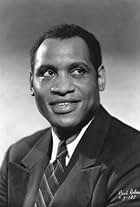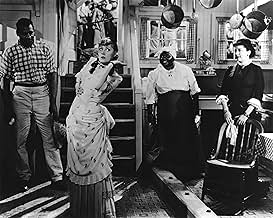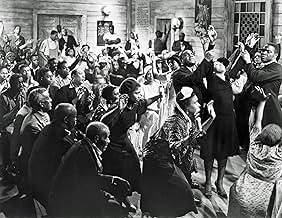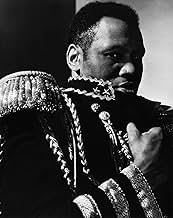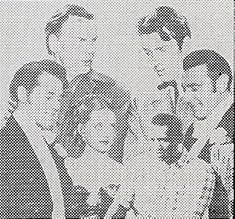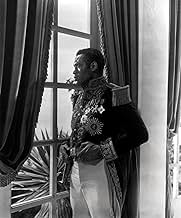Paul Robeson(1898-1976)
- Actor
- Soundtrack
This handsome, eloquent and highly charismatic actor became one of the
foremost interpreters of
Eugene O'Neill's plays and one of
the most treasured names in song during the first half of the twentieth
century. He also courted disdain and public controversy for most of his
career as a staunch Cold War-era advocate for human rights, as well as his very vocal support for Joseph Stalin and the Soviet invasion of Hungary in 1956. While the
backlash of his civil rights activities and left-wing ideology left him
embittered and practically ruined his career, he remains today a
durable symbol of racial pride and consciousness.
Born in Princeton, New Jersey, on April 9, 1898, Paul LeRoy Bustill Robeson and his four siblings (William, Benjamin, Reeve, Marian) lost their mother, a schoolteacher, in a fire while quite young (Paul was only six). Paul's father, a humble Presbyterian minister and former slave, raised the family singlehandedly and the young, impressionable boy grew up singing spirituals in his father's church. Paul was a natural athlete and the tall (6'3"), strapping high school fullback had no trouble earning a scholarship to prestigious Rutgers University in 1915 at age 17 -- becoming only the third member of his race to be admitted at the time. He excelled in football, baseball, basketball, and track and field, graduating as a four-letter man. He was also the holder of a Phi Beta Kappa key in his junior year and was a selected member of their honorary society, Cap and Skull. Moreover, he was the class valedictorian and in his speech was already preaching idealism.
Paul subsequently played professional football to earn money while attending Columbia University's law school, and also took part in amateur dramatics. During this time he met and married Eslanda Cardozo Goode in 1921. She eventually became his personal assistant. Despite the fact that he was admitted to the New York bar, Paul's future as an actor was destined and he never did practice law. His wife persuaded him to play a role in "Simon the Cyrenian" at the Harlem YMCA in 1921. This was followed by his Broadway debut the following year in the short-lived play "Taboo", a drama set in Africa, which also went to London. As a result, he was asked to join the Provincetown Players, a Greenwich Village theater group that included in its membership playwright Eugene O'Neill. O'Neill personally asked Paul to star in his plays "All God's Chillun Got Wings" and "The Emperor Jones" in 1924. The reaction from both critics and audiences alike was electrifying...an actor was born.
In 1925 Paul delivered his first singing recital and also made his film debut starring in Body and Soul (1925), a rather murky melodrama that nevertheless was ahead of its time in its depictions of black characters. Although Robeson played a scurrilous, corrupt clergyman who takes advantage of his own people, his dynamic personality managed to shine through. Radio and recordings helped spread his name across foreign waters. His resonant bass was a major highlight in the London production of "Show Boat" particularly with his powerful rendition of "Ol' Man River." He remained in London to play the role of Shakespeare's "Othello" in 1930 (at the time no U.S. company would hire him), and was again significant in a highly controversial production. Paul caused a slight stir by co-starring opposite a white actress, Peggy Ashcroft, who played Desdemona. Around this time Paul starred in the landmark British film Borderline (1930), a silent film that dealt strongly with racial themes, and then returned to the stage in the O'Neill play "The Hairy Ape" in 1931. The following year he appeared in a Broadway revival of "Show Boat" again as Joe. In the same production, the noted chanteuse Helen Morgan repeated her original 1927 performance as the half-caste role of Julie, but the white actress Tess Gardella played the role of Queenie in her customary blackface opposite Robeson.
Robeson spent most of his time singing and performing in England throughout the 1930s. He also was given the opportunity to recapture two of his greatest stage successes on film: The Emperor Jones (1933) and Show Boat (1936). In Britain he continued to film sporadically with Sanders of the River (1935), Song of Freedom (1936), King Solomon's Mines (1937), Dark Sands (1937) and The Tunnel (1940) in important roles that resisted demeaning stereotypes.
During the 1930s he also gravitated strongly towards economics and politics with a burgeoning interest in social activism. In 1934 he made the first of several trips to the Soviet Union and outwardly extolled the Soviet way of life and his belief that it lacked racial bias, despite the Holodomor and the later Rootless Cosmopolitan Campaign. He was a popular figure in Wales where he became personally involved in their civil rights affairs, notably the Welsh miners. Developing a marked leftist ideology, he continued to criticize the blatant discrimination he found so prevalent in America.
The 1940s was a mixture of performance triumphs and poignant, political upheavals. While his title run in the musical drama "John Henry" (1940), was short-lived, he earned widespread acclaim for his Broadway "Othello" in 1943 opposite José Ferrer as Iago and Uta Hagen as Desdemona. By this time, however, Robeson was being reviled by much of white America for his outspoken civil rights speeches against segregation and lynchings, particularly in the South. A founder of the Progressive Party, an independent political party, his outdoor concerts sometimes ignited violence and he was now a full-blown target for "Red Menace" agitators. In 1946 he denied under oath being a member of the Communist Party, but steadfastly refused to refute the accusations under subsequent probes. As a result, his passport was withdrawn and he became engaged in legal battles for nearly a decade in order to retrieve it. Adding fuel to the fire was his only son's (Paul Jr.) marriage to a white woman in 1949 and his being awarded the Stalin Peace Prize in 1952 (he was unable to receive it until 1958 when his passport was returned to him).
Essentially blacklisted, tainted press statements continued to hound him. He began performing less and less in America. Despite his growing scorn towards America, he never gave up his American citizenship although the anguish of it all led to a couple of suicide attempts, nervous breakdowns and a dependency on drugs. Europe was a different story. The people continued to hold him in high regard as an artist/concertist above reproach. He had a command of about 20 languages and wound up giving his last acting performance in "Othello" on foreign shores -- at Stratford-on-Avon in 1959.
While still performing in the 1960s, his health suddenly took a turn for the worse and he finally returned to the United States in 1963. His poet/wife Eslanda Robeson died of cancer two years later. Paul remained in poor health for pretty much the rest of his life. His last years were spent in Harlem in near-total isolation, denying all interviews and public correspondence, although he was honored for speaking out against apartheid in South Africa in 1978.
Paul died at age 77 of complications from a stroke. Among his many honors: he was inducted into the College Football Hall of Fame in 1995; he received a Grammy Lifetime Achievement Award in 1998; was honored with a postage stamp during the "Black Heritage" series; and both a Cultural Center at Penn State University and a high school in Brooklyn bear his name. In 1995 his autobiography "Here I Stand" was published in England in 1958; his son, Paul Robeson Jr., also chronicled a book about his father, "Undiscovered Paul Robeson: An Artist's Journey" in 2001.
Born in Princeton, New Jersey, on April 9, 1898, Paul LeRoy Bustill Robeson and his four siblings (William, Benjamin, Reeve, Marian) lost their mother, a schoolteacher, in a fire while quite young (Paul was only six). Paul's father, a humble Presbyterian minister and former slave, raised the family singlehandedly and the young, impressionable boy grew up singing spirituals in his father's church. Paul was a natural athlete and the tall (6'3"), strapping high school fullback had no trouble earning a scholarship to prestigious Rutgers University in 1915 at age 17 -- becoming only the third member of his race to be admitted at the time. He excelled in football, baseball, basketball, and track and field, graduating as a four-letter man. He was also the holder of a Phi Beta Kappa key in his junior year and was a selected member of their honorary society, Cap and Skull. Moreover, he was the class valedictorian and in his speech was already preaching idealism.
Paul subsequently played professional football to earn money while attending Columbia University's law school, and also took part in amateur dramatics. During this time he met and married Eslanda Cardozo Goode in 1921. She eventually became his personal assistant. Despite the fact that he was admitted to the New York bar, Paul's future as an actor was destined and he never did practice law. His wife persuaded him to play a role in "Simon the Cyrenian" at the Harlem YMCA in 1921. This was followed by his Broadway debut the following year in the short-lived play "Taboo", a drama set in Africa, which also went to London. As a result, he was asked to join the Provincetown Players, a Greenwich Village theater group that included in its membership playwright Eugene O'Neill. O'Neill personally asked Paul to star in his plays "All God's Chillun Got Wings" and "The Emperor Jones" in 1924. The reaction from both critics and audiences alike was electrifying...an actor was born.
In 1925 Paul delivered his first singing recital and also made his film debut starring in Body and Soul (1925), a rather murky melodrama that nevertheless was ahead of its time in its depictions of black characters. Although Robeson played a scurrilous, corrupt clergyman who takes advantage of his own people, his dynamic personality managed to shine through. Radio and recordings helped spread his name across foreign waters. His resonant bass was a major highlight in the London production of "Show Boat" particularly with his powerful rendition of "Ol' Man River." He remained in London to play the role of Shakespeare's "Othello" in 1930 (at the time no U.S. company would hire him), and was again significant in a highly controversial production. Paul caused a slight stir by co-starring opposite a white actress, Peggy Ashcroft, who played Desdemona. Around this time Paul starred in the landmark British film Borderline (1930), a silent film that dealt strongly with racial themes, and then returned to the stage in the O'Neill play "The Hairy Ape" in 1931. The following year he appeared in a Broadway revival of "Show Boat" again as Joe. In the same production, the noted chanteuse Helen Morgan repeated her original 1927 performance as the half-caste role of Julie, but the white actress Tess Gardella played the role of Queenie in her customary blackface opposite Robeson.
Robeson spent most of his time singing and performing in England throughout the 1930s. He also was given the opportunity to recapture two of his greatest stage successes on film: The Emperor Jones (1933) and Show Boat (1936). In Britain he continued to film sporadically with Sanders of the River (1935), Song of Freedom (1936), King Solomon's Mines (1937), Dark Sands (1937) and The Tunnel (1940) in important roles that resisted demeaning stereotypes.
During the 1930s he also gravitated strongly towards economics and politics with a burgeoning interest in social activism. In 1934 he made the first of several trips to the Soviet Union and outwardly extolled the Soviet way of life and his belief that it lacked racial bias, despite the Holodomor and the later Rootless Cosmopolitan Campaign. He was a popular figure in Wales where he became personally involved in their civil rights affairs, notably the Welsh miners. Developing a marked leftist ideology, he continued to criticize the blatant discrimination he found so prevalent in America.
The 1940s was a mixture of performance triumphs and poignant, political upheavals. While his title run in the musical drama "John Henry" (1940), was short-lived, he earned widespread acclaim for his Broadway "Othello" in 1943 opposite José Ferrer as Iago and Uta Hagen as Desdemona. By this time, however, Robeson was being reviled by much of white America for his outspoken civil rights speeches against segregation and lynchings, particularly in the South. A founder of the Progressive Party, an independent political party, his outdoor concerts sometimes ignited violence and he was now a full-blown target for "Red Menace" agitators. In 1946 he denied under oath being a member of the Communist Party, but steadfastly refused to refute the accusations under subsequent probes. As a result, his passport was withdrawn and he became engaged in legal battles for nearly a decade in order to retrieve it. Adding fuel to the fire was his only son's (Paul Jr.) marriage to a white woman in 1949 and his being awarded the Stalin Peace Prize in 1952 (he was unable to receive it until 1958 when his passport was returned to him).
Essentially blacklisted, tainted press statements continued to hound him. He began performing less and less in America. Despite his growing scorn towards America, he never gave up his American citizenship although the anguish of it all led to a couple of suicide attempts, nervous breakdowns and a dependency on drugs. Europe was a different story. The people continued to hold him in high regard as an artist/concertist above reproach. He had a command of about 20 languages and wound up giving his last acting performance in "Othello" on foreign shores -- at Stratford-on-Avon in 1959.
While still performing in the 1960s, his health suddenly took a turn for the worse and he finally returned to the United States in 1963. His poet/wife Eslanda Robeson died of cancer two years later. Paul remained in poor health for pretty much the rest of his life. His last years were spent in Harlem in near-total isolation, denying all interviews and public correspondence, although he was honored for speaking out against apartheid in South Africa in 1978.
Paul died at age 77 of complications from a stroke. Among his many honors: he was inducted into the College Football Hall of Fame in 1995; he received a Grammy Lifetime Achievement Award in 1998; was honored with a postage stamp during the "Black Heritage" series; and both a Cultural Center at Penn State University and a high school in Brooklyn bear his name. In 1995 his autobiography "Here I Stand" was published in England in 1958; his son, Paul Robeson Jr., also chronicled a book about his father, "Undiscovered Paul Robeson: An Artist's Journey" in 2001.
